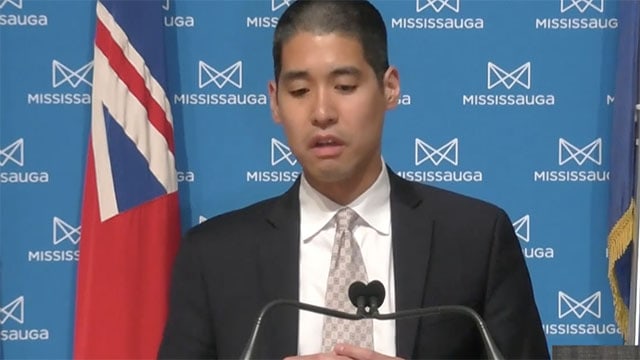Peel’s top doctor says a quarter of essential workers in Brampton and Mississauga are going to work sick
Published February 4, 2021 at 8:19 pm

Although new COVID-19 cases are dropping in Peel (Brampton, Mississauga and Caledon), Mayor Bonnie Crombie and Dr. Lawrence Loh, Peel’s Medical Officer of Health, are still frustrated by the lack of action from higher levels of government on paid sick days.
According to Loh, up to a quarter of Peel residents diagnosed with COVID-19 went to work while sick.
“I am…frustrated that I’m up here once again with no update on paid sick leave,” Crombie told reporters during a Feb. 3 press conference.
“I’ve talked to the ministers in both the provincial and the federal cabinets and will continue to do so, asking that they work together to put this important measure into place. I really believe that the levels of government can come together to figure this out.”
Crombie’s pleas come after weeks of calls from mayors, regional chairs and public health officials for paid sick leave for essential workers who continue to work with COVID-19 symptoms in order to avoid missing a paycheque.
On Jan. 11, 2021, Crombie released a statement, along with other GTHA mayors and regional chairs, stating that the failure to pay ill workers is discouraging them from getting tested and prompting them to work while sick, enabling further spread of the virus.
The province has thus far declined to offer sick pay directly to workers, instead directing employees to apply for a federal government program that pays people $450 a week for up to two weeks after their absence rather than during.
Many GTHA mayors, chairs and public health experts have argued that the program does not go far enough.
“Workplaces continue to be the main driver of this virus and as we have seen with Dr. Loh’s report, workers are going in to work sick because they don’t have access to paid sick leave,” Crombie said.
“This isn’t just happening in Peel, it’s happening right across the province. These men and women working in factories, food processing facilities, warehouses and of course, grocery stores, continue to provide the rest of us with the essential items that we need. These are the staff in our long-term care homes who are taking huge personal risk to care for our seniors. These are the low-income workers who cannot afford to miss a paycheque and the reality is that many are women and many come from racialized groups that already face significant barriers.”
According to Peel Public Health’s website, a total of 240 outbreaks have been linked to workplaces in Brampton, Mississauga and Caledon since March 2020. According to data posted on the site, 39 per cent of outbreaks have been linked to manufacturing and industrial facilities.
Peel has been one of the hardest-hit regions in Ontario, logging 265 new cases on Feb. 4.
At the press conference, Loh–who has encouraged Peel residents to voluntarily limit the number of non-essential goods they order online to take pressure off fulfilment centre and delivery workers–said that more needs to be done to protect essential workers amid the second wave of the pandemic.
Loh told reporters that workers don’t only need sick pay, but also more proactive workplace inspections.
“Through numerous conversations with our Ministry of Labour partners, I have learned that the nature of regulations in place actually may limit inspector access and more frequent proactive workplace inspections,” Loh said.
“I call on this to be reviewed and resolved to ensure that our data on workplace outbreaks and high-risk sectors can be acted on. I also call for additional resources to be given to our Ministry of Labour partners to ensure that workers and our community can be protected.”
Loh also called for more rapid tests to be deployed at workplaces.
Echoing Crombie’s call for sick pay, Loh said that Peel’s isolation centres–designed to allow people to recover from COVID in the safety of a free and private hotel room–can only truly be effective if workers can take time off to use them.
“We have received funding to open voluntary isolation housing, but the people that need it can’t take time off work to go there,” he said, adding that many workers are afraid to even be tested for COVID-19 if they have symptoms.
“Our own data at Peel Public Health showed that 25 per cent of the cases in our region went to work while they were symptomatic…how will we keep these aggressive new variants at bay if our frontline workers cannot afford to take time off work to stop the spread?”
New and theoretically more infectious variants of COVID-19 that originated from South Africa and the UK have both been found in Mississauga.
Crombie told reporters that it’s time for higher levels of government to listen to public health officials and their call for sick pay.
“We always say that we must listen to our health experts. So why exactly have we ignored their advice on paid sick leave? Please, let’s get this right,” she said.
“I will continue to advocate for this. I simply won’t slow down. It’s going to be months until all Ontarians are vaccinated and paid sick leave is one of the best tools we have to limit the spread of COVID-19. It’s an investment that can save lives and allow us to begin our economic recovery.”
INsauga's Editorial Standards and Policies

